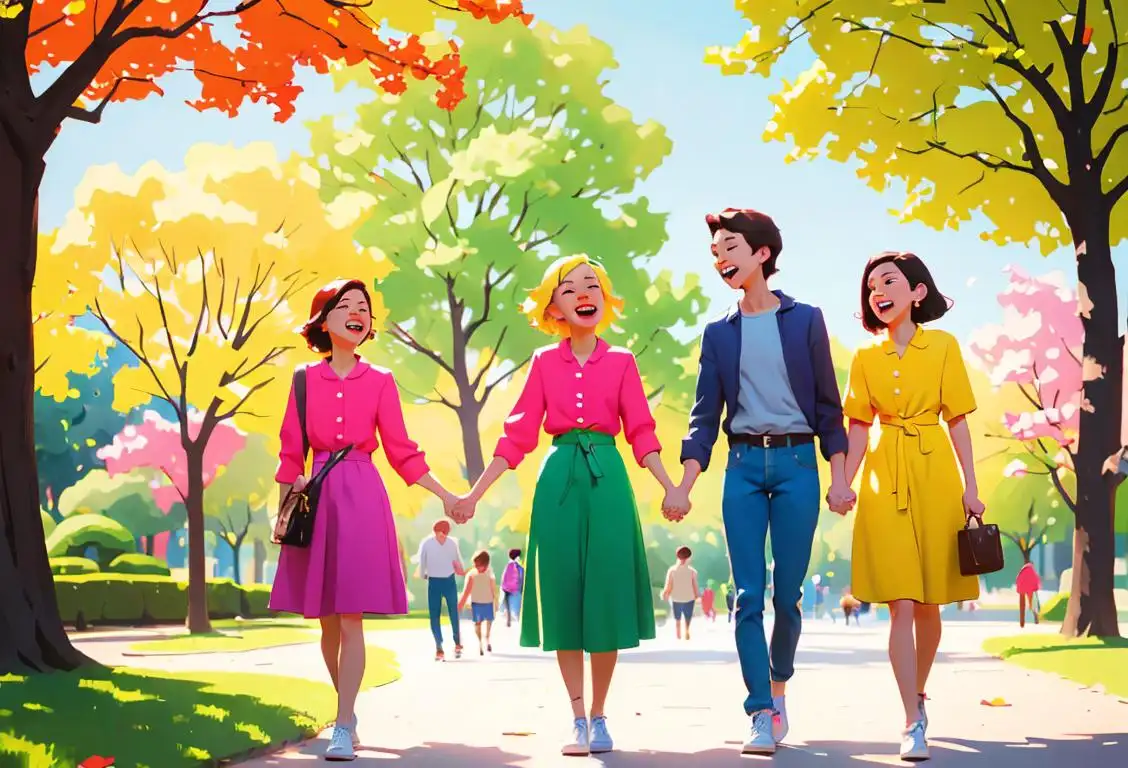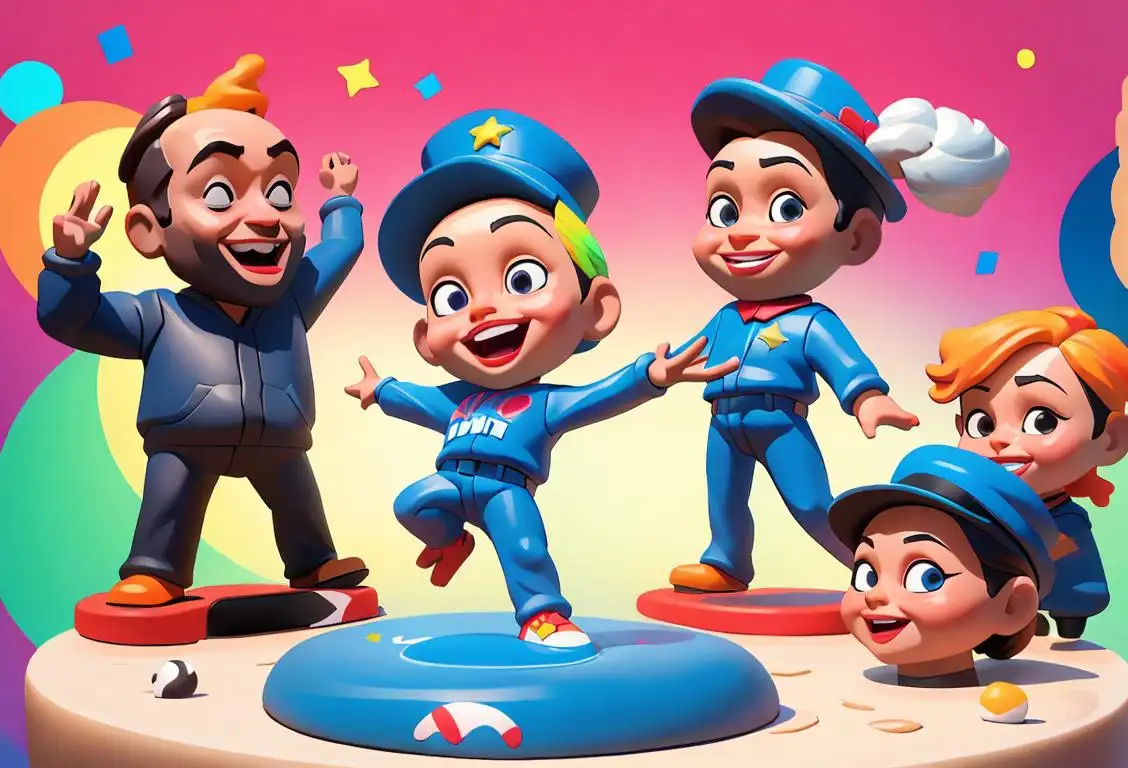National Be Happy Day

Welcome to the fabulous world of National Be Happy Day! Get ready to put a smile on your face and spread the joy as we dive into the history and significance of this delightful day. Whether you're an expert in happiness or just looking for a reason to boost your mood, National Be Happy Day is here to brighten your day!
When is Be Happy Day?
It's national be happy day on the 3rd March.
The Internet History of National Be Happy Day
Every year on March 3rd, the internet explodes with happiness as people across the globe celebrate National Be Happy Day. Originally established as a way to promote positivity and well-being, this joyous occasion has quickly become a beloved event in the online community.
Did you know that National Be Happy Day has its roots in ancient traditions? In many cultures, there are annual celebrations dedicated to spreading happiness and driving away negative energy. From festivals of laughter to rituals of joy, people have long recognized the importance of embracing positivity in their lives.
The popularity of National Be Happy Day skyrocketed with the rise of social media. As people began sharing messages of happiness and gratitude online, the movement gained momentum and attracted millions of participants worldwide. Now, it's not uncommon to see hashtags like #NationalBeHappyDay trending on various platforms, with people sharing inspirational quotes, uplifting stories, and adorable pictures of fluffy animals.
How to Celebrate National Be Happy Day
Celebrating National Be Happy Day is as easy as putting on a smile! Here are a few ideas to get you started:
- Surround yourself with loved ones: Spend quality time with your family, friends, or pets. Enjoy some laughter and create beautiful memories.
- Indulge in delicious food: Treat yourself to your favorite comfort foods. Whether it's a slice of pizza or a decadent dessert, savor every bite and let it bring you joy.
- Get active: Engage in your favorite sports or physical activities. Moving your body releases endorphins, which are known as the feel-good hormones.
- Practice gratitude: Take a moment to reflect on the things you're grateful for. Write them down or share them with others. Expressing gratitude can instantly boost your mood.
Fun Fact About National Be Happy Day
Did you know that laughter is contagious? According to scientific research, the sound of laughter triggers areas in the brain that control facial movement and emotional response. So, next time you hear someone laughing, don't be afraid to join in and spread the joy!
History behind the term 'Be Happy'
1776
The Birth of the Phrase
The term 'be happy' first originated in 1776 during the American Revolutionary War. American writer and philosopher Thomas Jefferson wrote the phrase 'the pursuit of happiness' in the Declaration of Independence, which stated that all individuals have the right to pursue happiness as an essential part of their lives.
1698
The Birth of 'Be Happy'
The term 'be happy' has its origins in the late 17th century, specifically in the year 1698. It emerged as a popular phrase during the Enlightenment period when the pursuit of happiness and well-being became a prominent philosophical idea. The expression 'be happy' encapsulates the notion of actively seeking and embracing joy and contentment in one's life.
1930
Redefining Happiness
In the early 1930s, the field of positive psychology emerged, focusing on studying and understanding human happiness. Psychologist and philosopher William James explored the idea of happiness and identified it as a multidimensional concept, suggesting that it involved emotional, cognitive, and sensory experiences. This shift in mindset broadened the understanding of happiness beyond mere pleasure or material possessions.
1776
The American Revolution and 'Be Happy'
During the American Revolution in 1776, the term 'be happy' took on additional significance. It became closely associated with the ideals of liberty and independence. The pursuit of happiness was even mentioned in the United States Declaration of Independence as one of the unalienable rights that all individuals possess. This connection between happiness and freedom further solidified 'be happy' as a powerful cultural phrase.
1972
The Happiness Index
In 1972, the Kingdom of Bhutan introduced the concept of Gross National Happiness (GNH), a holistic measure of progress that seeks to prioritize happiness and well-being over economic growth alone. This term gained international attention and initiated discussions on the importance of happiness as a measure of societal development and policy-making.
1880
The Rise of Positive Thinking Movements
In the late 19th century, 'be happy' gained traction as a result of the rise of positive thinking movements. Influenced by the works of philosophers and self-help authors like Ralph Waldo Emerson and William James, these movements emphasized the power of positive thoughts and attitudes in achieving happiness and success. 'Be happy' became a mantra, encouraging individuals to cultivate optimism and a positive mindset.
1950
The Emergence of Happiness Psychology
The term 'be happy' became even more prominent in the 1950s with the emergence of happiness psychology as a distinct field of study. Psychologists like Abraham Maslow and Carl Rogers focused on understanding the factors that contribute to human well-being and happiness. 'Be happy' became part of the broader discourse on personal fulfillment and psychological well-being.
1998
Positive Psychology Movement
The term 'be happy' gained further popularity with the emergence of the positive psychology movement in the late 1990s. Psychologists such as Martin Seligman focused on promoting happiness and well-being through the scientific study of positive emotions, character strengths, and positive institutions. This movement aimed to provide individuals with practical strategies to enhance their overall happiness and life satisfaction.
2013
International Day of Happiness
In 2013, the United Nations declared March 20th as the International Day of Happiness to recognize the importance of happiness and well-being as universal goals for all human beings. This day serves as a global reminder to prioritize happiness, promote mental well-being, and celebrate the positive aspects of life.
2000
The Modern Culture of Happiness
In the 21st century, 'be happy' has become an integral part of modern culture. It is frequently used as a reminder to prioritize happiness and self-care in the face of stress and challenges. With the rise of social media and the influence of positive psychology movements, 'be happy' has become a popular hashtag and inspirational slogan, symbolizing the universal human desire for happiness and fulfillment.
Did you know?
Did you know that laughter is contagious? According to scientific research, the sound of laughter triggers areas in the brain that control facial movement and emotional response. So, next time you hear someone laughing, don't be afraid to join in and spread the joy!Tagged
awareness fun loved ones sportsFirst identified
21st March 2016Most mentioned on
3rd March 2021Total mentions
11Other days
Suicide Prevention Month Day
Happiness Day
Drink A Beer Day
Trivia Day
Memorial Day
Take A Hike Day
Foundation Day
Cancer Survivors Day
Bobblehead Day
Bowling Day









